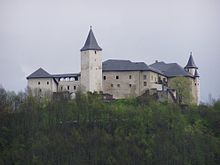Novel I.
Roman I (* before 1100 in Carinthia ; † April 3, 1167 in Gurk ) was bishop of Gurk from 1131 to 1167 . He had Strasbourg Castle and the Gurk Cathedral built.
Live and act
Roman came from the Salzburg-Styrian ministerial family of Leibnitz. His birthplace was in Carinthia, Radweg or Willersdorf are suspected. He was first recorded in 1116 as provost of the collegiate chapter of Maria Saal . From 1124/1125 he was archdeacon of Carinthia and also archbishop chaplain in Salzburg. He was also the tutor of the later Carinthian dukes Ulrich and Heinrich . Roman was deeply influenced by the Hohenstaufen ideal of knights. He was also a personal friend of Archbishop Konrad I of Salzburg and Emperor Friedrich I Barbarossa .
In 1131 Roman was appointed fourth bishop of Gurk by Archbishop Konrad. From 1136 he was also coadjutor of the aging Konrad. In many cases he had a moderating and balancing effect, for example when he ended the long dispute with the Patriarchate of Aquileia and recognized the patriarchate's right to tithes over the possessions of Salzburg and Gurk. On many occasions he represented or accompanied the archbishop in the entire area of the archdiocese, such as in church and monastery consecrations.
One step in the direction of the imperial immediacy of the diocese of Gurk, which Roman and the cathedral chapter were striving for, was that Konrad awarded the diocese the tithe in 1144 , which had been refused to the young diocese, which had only been founded in 1072. In 1145 the diocese was even able to “sneak” a document from Pope Lucius II , in which he - albeit without a legal basis and without consequential effects - allowed the gurbers the free election of bishops, provosts and bailiffs.
In the election of Conrad's successor as Archbishop of Salzburg, Eberhard I , Roman took part on an equal footing with the other suffragan bishops in 1147 . He continued to maintain his influential position in the archbishopric and appeared frequently as a witness, counselor, and mediator for the archbishop.
Strasbourg was also mentioned for the first time in a document from Romans in 1147 and must have been completed by then. The construction of the Gurk Cathedral began after 1140. Other castles and palaces that Roman had built were Burg Pöckstein , Preschin (near Cilli ) and Wolkenburg (near Oblagorica ). In 1158 Roman gave the bailiwick of the diocese Duke Heinrich of Carinthia.
In 1160 Roman was involved in armed conflict with two relatives of Countess Hemma von Zeltschach, who refused to recognize the Countess' will, in which she had bequeathed her property to the diocese.
In the middle of his fight with Pope Alexander III. Emperor Friedrich issued a letter of protection for Roman in 1162 in which he confirmed the free election of bailiffs to the diocese. The choice of words in the certificate shows Friedrich's great appreciation for Roman, who remained loyal to Pope Alexander in the retinue of Salzburg's Archbishop: he calls him "his honored prince, to whom he is devoted with special love and affection" . In the future, Roman also tried to find a compromise between the emperor and archbishop Eberhard, who was a much more exposed follower of Alexander than he was himself.
Eberhard's successor as Archbishop of Salzburg was Conrad II in 1164 , but as a supporter of Pope Alexander he did not receive the regalia from the Emperor. This also jeopardized a possible successor to the aging novel. On All Saints' Day in 1164 he therefore expressly confirmed the possessions of the Gurk cathedral chapter in a kind of will and made other extensive donations. Roman died on April 3, 1167 after he had not appeared in documents for the last three years. "In the long line of Gurk bishops, he was one of the great ones, if not the greatest among them at all."
Footnotes
- ^ Obersteiner: The bishops of Gurk. 1072-1822. 1969, p. 30.
- ^ Obersteiner: The bishops of Gurk. 1072-1822. 1969, p. 38: Venerabilem Romanum Gurcensem episcopum honorabilem principem nostrum, quem speciali prerogativa dilectionis et gracie amplectimur et diligimus .
- ^ Obersteiner: The bishops of Gurk. 1072-1822. 1969, p. 44.
literature
- Gerhard Diehl: Roman I. In: Biographisch-Bibliographisches Kirchenlexikon (BBKL). Volume 8, Bautz, Herzberg 1994, ISBN 3-88309-053-0 , Sp. 624-625.
- Jakob Obersteiner: The bishops of Gurk. 1072–1822 (= From Research and Art. 5, ISSN 0067-0642 ). Verlag des Geschichtsverein für Kärnten, Klagenfurt 1969, pp. 26–44.
- Franz Ortner: Roman I .. In: New German Biography (NDB). Volume 22, Duncker & Humblot, Berlin 2005, ISBN 3-428-11203-2 , p. 15 f. ( Digitized version ).
| personal data | |
|---|---|
| SURNAME | Novel I. |
| BRIEF DESCRIPTION | Catholic Bishop of the Diocese of Gurk |
| DATE OF BIRTH | before 1100 |
| PLACE OF BIRTH | Carinthia |
| DATE OF DEATH | April 3, 1167 |
| Place of death | Cucumber |


